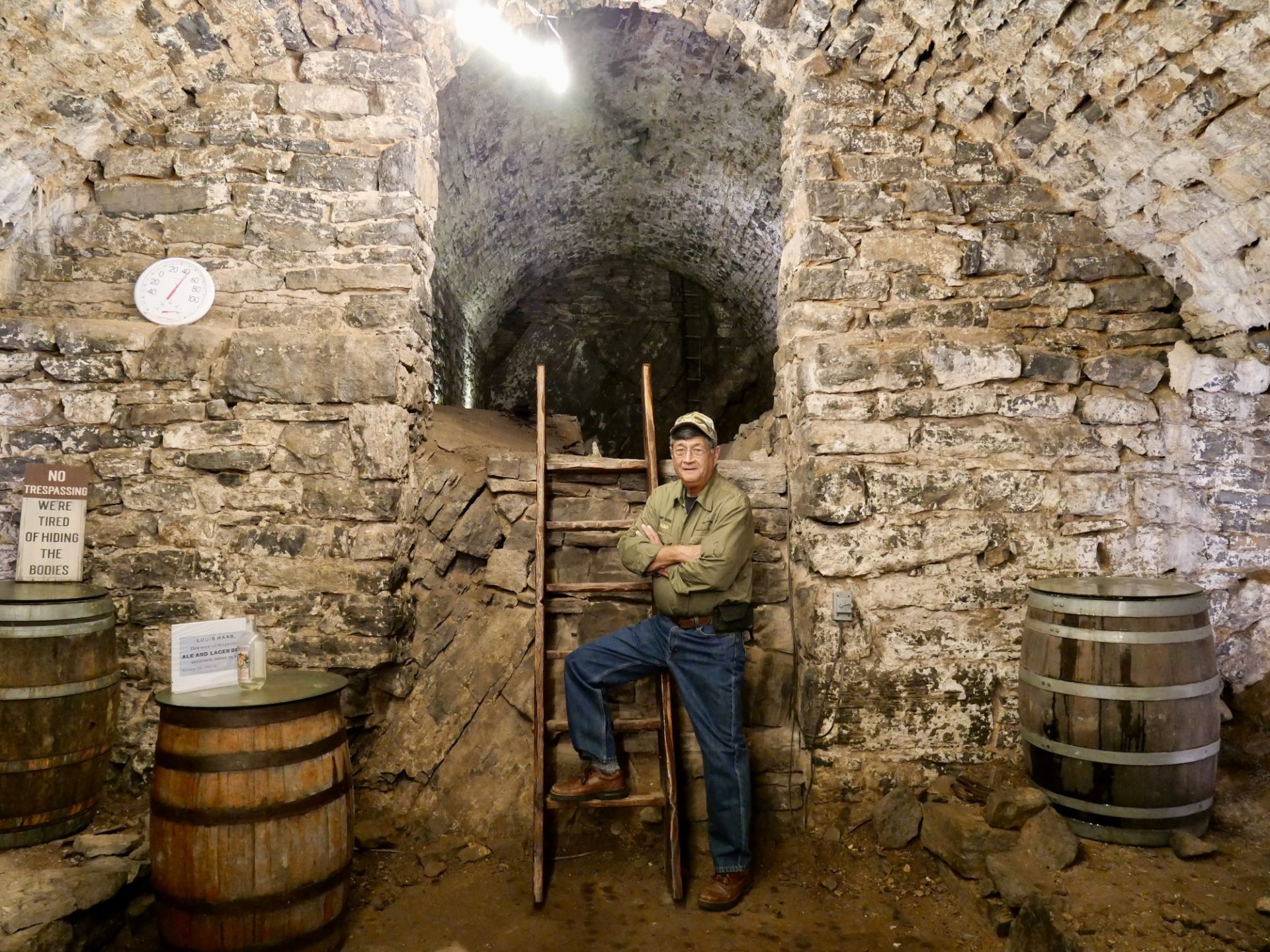
Jim Lanning believes in preserving both the natural beauty of Spring Creek and the history of the Spring Creek Brewery. (Photo by Matt Maris)

Jim Lanning believes in preserving both the natural beauty of Spring Creek and the history of the Spring Creek Brewery. (Photo by Matt Maris)
Hidden within a hillside in Benner Township are 19th-century beer vaults that once held and lagered barrels of Centre County’s finest. By the time the township was formed in 1853, the village of Roopsburg was thriving, in large part because of its brewery on Spring Creek. The brewery had a historic run from 1826 until it closed in 1902. The vaults are still there, and so is the brewer’s mansion.
Today the property is owned by Jim and Denise Lanning. Water has always been what has drawn people to the site. For the Lannings, water is the very essence of the site’s past, present, and future.
Jim boiled his vision for the Spring Creek House at Camp Breac into one statement: “It’s all about the water.” In Gaelic, donn breac means wild brown trout, and Jim wears many hats to ensure the health of the Spring Creek Watershed and the creek’s wild trout. When the Lannings purchased the property in 2018, they knew they had found a place of great “beauty and peace” and made it their mission to make it accessible to the community. Denise shared that “when you own a place like this, you have a responsibility to preserve the history and share it with the community.” Jim, a Vietnam veteran, has also made it a refuge for other veterans. Countless veterans, anglers, visitors, and groups like ClearWater Conservancy have been hosted at Camp Breac. This is typical of Lanning hospitality, generously giving public access to the property’s rich history and natural beauty. “Whether it’s the community or veterans, we are here for them.”

Back when Jacob Roop purchased the property in 1825, he was also inspired by Spring Creek. Roop, a gunsmith for whom Roopsburg was named, started the Spring Creek Brewery in 1826. Roop’s gunsmith house is still there and is presently the home of Louise Houser Perts; she was born in that house in 1925.
Roop understood that it took good water to brew quality beer, and he could always sell as much beer as he was willing to make. Drinking locally has always been the way to go. Roop filled a local void, as there were no other breweries for miles. Even when the brewery was for sale in 1896, the advertisement stated that “within 25 miles there is not a single brewery in the field.” That was certainly a long way back in the days before automobiles and refrigeration.
The brewery was eventually purchased by Henry Brockerhoff, who secured Louis Haas from Bavaria, Germany, to be his brewmaster. The two partners expanded production for the Roopsburg Brewery and built the beer vaults in 1857. Things in Roopsburg were going well. Haas had the Spring Creek House built in 1860, and Brockerhoff built the brick gristmill, also known as the Roopsburg Mill, across the creek circa 1861. Haas, “Brewer of Superior Ale and Lager Beer,” took full ownership in 1872 and mastered his craft until his death in 1882. His son Robert and other proprietors such as Matthews Volk kept the brewery alive until an unforeseen force blew in and dried up business—temperance, or abstinence from alcohol.
Bellefonte certainly had an active Women’s Christian Temperance Union (WCTU). It seems the brewery was already losing its reputation from the days of Haas when temperance efforts made it difficult at times to renew their brewer’s license. The license was denied for at least a year from 1889 to 1890 on the issue of temperance.
One of the last times locally produced beer flowed at Roopsburg was in 1901. Matthews Volk could not afford to renew the $259 brewer’s license fee and abandoned the business. The only problem was that he had about one hundred barrels of beer on hand. The internal revenue collector “settled the matter by emptying the whole lot into Spring Creek.” It was not the temperance crusader who took the hatchet to the barrels of beer this time; it was the tax collector.
To proprietors like Jim and Denise Lanning, history holds many lessons, and the Spring Creek Watershed has paid the price for some. The Lannings carry on the legacy of the Spring Creek House in a new way. Water is not just a key ingredient; it is the lifeblood of all good things. Preservation and conservation are not about taking; they’re about giving. Our history and future are dependent on watersheds like Spring Creek. At Camp Breac, it’s all about the water. Learn more at campbreac.com. T&G
Sources:
Centre Press (Bellefonte, PA). October 3, 1862.
https://panewsarchive.psu.edu/lccn/sn85025166/1862-10-03/ed-1/seq-4/
Gruendler, Diana R. “The Story of Roopsburg Brewery.” In Benner Township: 150 years of families, forging, farming, fishing, and flying. Pennsylvania: Benner Township, 2003.
“River of Wasted Beer.” Middleburgh Post (Middleburgh, PA). May 2, 1901.
https://panewsarchive.psu.edu/lccn/sn86081895/1901-05-02/ed-1/seq-1/ “Unfair and Unjust Action of the Court.” Democratic Watchman (Bellefonte PA). March 21, 1890. https://panewsarchive.psu.edu/lccn/sn83031981/1890-03-21/ed-1/seq-8/
Local Historia is a passion for local history, community, and preservation. Its mission is to connect you with local history through engaging content and walking tours. Local Historia is owned by public historians Matt Maris and Dustin Elder, who co-author this column. For more, visit localhistoria.com.
Receive all the latest news and events right to your inbox.
403 S. Allen Street
State College, PA 16801
Phone: 814-238-5051
